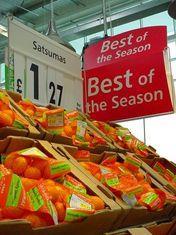

Sir Terry Leahy, chief executive of Tesco, told a recent company meeting that the long-term decline in consumer spend on food could be at an end, according to newspaper reports.
“For decades, food has been a falling proportion of total consumer spending and as a business we have contributed to this by cutting prices to help people spend less,” Sir Terry was quoted as saying by Sunday newspaper The Observer. “That won't change, but the long-term trend of declining spend on food has stopped.”
The admission is fueled, it is thought, by growing consumer concern surrounding cheap food and its safety, as well as rising wheat prices. “I believe we're seeing a fundamental shift in the priority that consumers place on food,” said Leahy. “The link between diet and health, interest in cooking, provenance - including local and fair trade - is also not only about affluent customers. The growth in the proportion of our customers buying organics is fastest among less affluent customers. This could be a big long-term positive for the industry.”
The Observer pointed to Tesco’s refusal to enter a price war on chicken as the example of its about turn. When Asda slashed the price of its 1.55kg chickens by 22 per cent, Tesco, which the market expected to follow suit, in fact chose to raise the price for the same size bird by four per cent to £3.39, a rise of four per cent - in an attempt to reassure consumers of the quality of the product and that producers were getting a fair deal.
Asda was recently named Britain's cheapest supermarket for the 10th year running by trade magazine The Grocer, although Tesco claims that an independent price-checker proved it was winnng on low prices.
Its apparent desire to raise prices, albeit not across all sections of its stores yet, could be its response to the Competition Commission investigation into its dealings with suppliers.
The cost of wheat has hit an all-time high owing to poor harvests and rising global demand. It is likely to prompt hikes in the cost of food and cannot be absorbed by the food producers.
Tesco will not say whether its poultry stance will be reflected across other categories, but Alex Waugh, director of the National Association of British and Irish Millers, said he shares Leahy's belief that the public is beginning to mistrust ever-decreasing food prices.
“This is a sign that supermarkets are finally beginning to understand that persistent below-cost selling is not a sustainable practice,” he told The Observer. “It is not even what customers want any more: the market for the cheapest lines has declined for bread by about half in recent years. There is a growing market for quality and fairness where price is not predominant.”
Asda told The Observer it will continue down its price-cutting line: “At the moment we have no plans to react,” said a spokeswoman. “We'll try to keep prices as low as possible for as long as we can, working with our suppliers to ensure that customers get the best possible deal. While the rising cost of commodities does provide both suppliers and retailers with an ongoing challenge, we owe it to our customers to try to give them the best possible price for their shop.”



